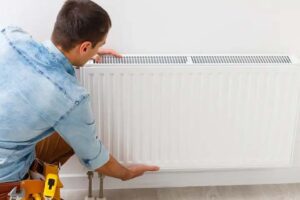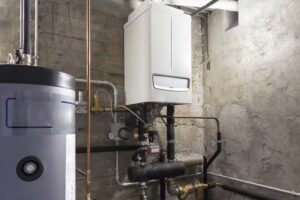Table of Contents
Determining the best temperature for your boiler can be challenging. The settings on your boiler might be very different from someone else’s because the weather changes and everyone needs hot water differently. You can find the best temperature for your boiler or hot water tank if you know what kind of boiler you have and how standard temperature sets work. Finding the right temperature for your home can have a big effect on your energy costs. This blog will show you how to do it.
Key Components that Influence Your Room Temperature
The central heating temperature of a room can be changed by many things, such as the room’s size and how people move around in it. The temperature in your home can also be affected by the following things.
| Key components | |
| Air temperature | It is a measure of the warmness or coldness of the air, which is influenced by how hot or cold it is outside of the home. |
| Air velocity | It is significant air moving via the room caused by factors like open windows and draughts. It can also be improved by adding curtains, shutters, or draught-proofing. |
| Radiant temperature | It is heat that is thrown out from appliances within the room, like an oven. |
| Humidity | It is the moisture in the air. The more humidity in the air, the easier it is to maintain the hottest temperature. If the moisture level is low, the temperature inside your home should be hot. |
Types of Boilers
It can be helpful to understand which type of boiler you have in your house and how it works before adjusting the central heating temperature.
Regular Boiler:
A regular boiler is also called a conventional boiler or a heat-only. These kinds of boilers consist of three elements — the boiler, a separate tank to store cold water, and a separate cylinder to store hot water. The cold water tank uses gravity to fill the boiler and is typically installed in a home’s attic or loft space. The boiler then heats the water and supplies it directly to the radiators of the central-heating system. It fills the hot water cylinder as well, so there’s hot water on demand.
A conventional boiler is best for large homes, ideal for homes with multiple bathrooms and a low-pressure water supply. However, typical boilers require more space because their separate tanks simultaneously supply hot water and heating.
System Boiler:
System boilers can provide the radiators with heating and hot water on demand like regular boilers via a hot water cylinder. This kind of boiler only consists of a boiler and a hot water cylinder. The home’s main water supply provides water into the boiler, removing the requirement of a separate tank of cold water.
Large houses with significant warm water requirements are also perfect for these boilers. By having many of the parts inside, they take up less space and give you more installation choices than regular boilers. Also, system boilers still need space for a hot water cylinder, and if the main water source has low water pressure, it will affect the flow rate throughout the whole house.
Combi Boiler:
Combination boilers are the best option for central heating because they supply the heating and warm water in a single unit. A home’s main water supply feeds cold water into the combi boiler. The boiler burns gas fuel to create heat and employs a heat exchanger to transfer the heat to the water from the compression chamber. Because combi boilers can warm up instantly. These boilers are much more compact than others, as they don’t need space for a separate tank of water. This characteristic makes them ideal for smaller properties. Although combi boilers provide hot water and heating in one unit, they can not simultaneously direct hot water to the tap and central heating.
Boiler Temperature Settings
In short, there’s no single temperature you should set your boiler. The temperature will vary depending on several variables, including the weather and personal preference. You should have to adjust the boiler temperature to keep it within a specific range to prevent it from overheating.
Recommended Temperature Settings:
The central heating temperature settings for the warm water cylinder will differ.
When the weather turns colder or warmer, it’s best to modify the high/low-temperature settings on your boiler for water heating. Higher boiler temperatures (often between 65°C and 75°C) are more suited for the winter, while lower boiler temperatures (generally between 45°C and 50°C) are more effective and manageable in the summer.
First of all, understanding the boiler temperature settings is crucial. The typical temperature range for most boilers is between 140°F (60°C) and 180°F (82°C). However, the recommended temperature for efficient central heating often falls between 140°F and 160°F (60°C — 71°C). This range ensures a comfortable indoor climate while avoiding excessive energy expenditure.
If you set the temperature too low, you might not be warm enough, especially in the winter, which could be uncomfortable. Setting it too high, on the other hand, can make your home too hot and raise your energy bills for no reason.
Insulation is one of the most important things to think about when setting the temperature. Homes that are well sealed can keep heat in, so the boiler can be set lower without affecting comfort. Keeping the temperature inside stable requires properly sealed windows, protected walls, and enough insulation in the attic.
Tips for Energy Efficiency
Use your home’s temperature controls to heat your home efficiently and maximise energy efficiency. Programmable thermostats and thermostats for individual rooms give you more precise control over each room’s temperature. For example, your bedroom should be warmer than other rooms to ensure a comfortable night of sleep in the winter.
Smart temperature controls can automatically adjust your home’s temperature or let you access the controls from a mobile device. These features allow you to decrease heat consumption when you’re far from your home. Fixing the boiler to fluctuate four to five degrees during several times of the day can help efficiently heat your home. Keeping your home cooler while you’re away will also help with cost-effectiveness.
Let’s Conclude
Overall, the optimal boiler temperature for central heating depends on comfort, energy savings, and weather. Consider temperature conditions and make a home-specific plan. To maximise home efficiency and comfort, consider insulation, personal comfort, weather, thermostat programming, maintenance, radiator types, and hot water usage. Contact us for UK boiler help.
Energy-Efficient Solutions With Grant Boilers
Being able to heat your home and have hot water is necessary to make your home comfortable, especially during the winter months. Buying fuel to keep your central-heating boiler running can be a hassle—but that changes with Grant Boilers. We allow consumers to order oil and gas online to keep their homes warm without disrupting their daily lives. Our reliable team will deliver your order within three business days or sooner.
Explore our services or contact a member of our team today!




